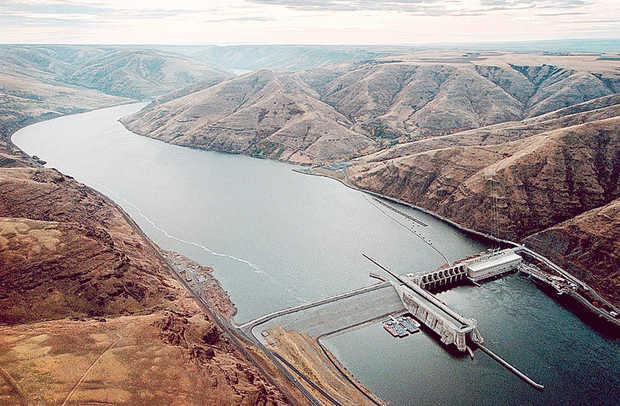forum
library
tutorial
contact

Inslee, Murray to Ponder
Future Without Dams
by Eric Barker
Lewiston Tribune, October 15, 2021
|
the film forum library tutorial contact |

|
Inslee, Murray to Ponder
by Eric Barker
|
Washington governor says he and longtime senator will fast-track research into replacing
services provided by four lower Snake River dams, in case of breaching
 Washington Gov. Jay Inslee said Thursday that he and Washington Sen. Patty Murray will initiate a fast-tracked process seeking ways to replace services provided by the lower Snake River dams.
Washington Gov. Jay Inslee said Thursday that he and Washington Sen. Patty Murray will initiate a fast-tracked process seeking ways to replace services provided by the lower Snake River dams.
The announcement is the strongest indication yet that the two powerful Democrats from the Evergreen State are serious about their stated desire to save threatened and endangered Snake River salmon and steelhead and that they may eventually support dam breaching.
"We know (the dams) are a salmon impediment, we know that the salmon are on the verge of extinction and we also know they do provide services upon which a lot of folks and our economy depends," Inslee said. "I believe the way to advance this discussion nationally and in our state is to have a rigorous, robust and fast assessment of how to replace those services if we breach those dams."
He said Murray would soon announce more details of the process that is expected to produce a report in less than a year.
"We don't have a lot of time with these salmon, so we are going to put the pedal to the metal to have the best answer to that question as humanly possible by next summer," he said.
Inslee was participating in a moderated online panel discussion, organized by the Washington Conservation Voters, with Nez Perce Tribal Executive Committee Vice Chairman Shannon Wheeler when he made the comments.
Snake River salmon and steelhead have been protected under the Endangered Species Act since the 1990s, and the region has invested about $17 billion in efforts to recover the iconic fish. Actions like habitat improvement, spilling water at the dams and harvest and hatchery reforms have not yet led to recovery. A recent study by the Nez Perce Tribe found many of Idaho's spring chinook and steelhead runs are tipping dangerously close to extinction.
Wheeler said Thursday that millions of spring chinook once returned to the Snake River, but this year only about 6,000 wild springers came back to spawn, and the return of hatchery fish was so low it provided a harvest quota of only about 3,000 fish for the tribe, "which was less than one fish per tribal member."
"This meant closures of our fisheries," he said. "When we are closing our fisheries, that is taking away a part of who we are."
Inslee stopped short of saying he supported dam removal. But Congressman Mike Simpson, a Republican representing Idaho's Second Congressional District, has concluded the fish can't be saved with the dams in place.
Last February, Simpson unveiled a $33 billion concept that would breach the dams and make investments in affected communities and industries. His work was enthusiastically backed by the Nez Perce and other tribes of the Pacific Northwest as well as fishing and conservation groups.
But the idea, which lacked key details, was largely rejected by most members of the Northwest Congressional Delegation. At the time, Inslee and Murray politely thanked Simpson for introducing the concept but said it should not be funded in President Joe Biden's Build Back Better legislation. Instead they backed a science- and consensus-based process that includes "all voices" and options, up to and including breaching.
On Thursday, environmental groups like the Idaho Conservation League found encouragement in Inslee's desire that the process move quickly.
"A lot of good work has already been done on this topic in the region, so there is no need to start from square one," the group's executive director, Justin Hayes, said. "I encourage Inslee and Murray to use all that Mike Simpson has already advanced as the starting point, and I hope Inslee and Murray will actually work with Congressman Simpson so that together they can develop legislation that implements these needed actions."
But dam backers said breaching would push back efforts to reduce carbon-trapping greenhouse gasses.
"It doesn't make sense to talk about replacing the dams' services until we've fully decarbonized our grid first," said Kurt Miller, executive director of Northwest River Partners. "Gov. Inslee has called the climate crisis an existential threat to humanity. We know it is an existential threat to salmon, so getting rid of carbon-free resources before the rest of the grid is decarbonized just doesn't make sense."
Inslee said more than dam removal is needed to help salmon and steelhead, and fighting climate change will be critical.
"We have so much work to do in so many different habitats for the salmon," he said. "Everything we do for salmon in the Snake we also have to do in the mid channel (of the Columbia River) so the water is not too hot that they can't swim up the river and in the North Pacific so that ocean acidification doesn't destroy the food chain."
learn more on topics covered in the film
see the video
read the script
learn the songs
discussion forum
